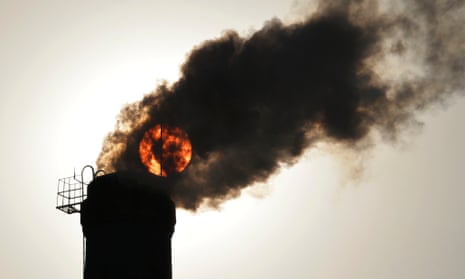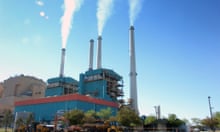China, the world's biggest greenhouse gas emitter, will limit its total emissions for the first time by the end of this decade, according to a top government advisor.
He Jiankun, chairman of China's Advisory Committee on Climate Change, told a conference in Beijing on Tuesday that an absolute cap on carbon emissions will be introduced.
"The government will use two ways to control CO2 emissions in the next five-year plan, by intensity and an absolute cap," Reuters reported He as saying. Though not a government official, He is a high level advisor.
However, Jiankun later in the day appear to row back on the comments. "What I said today was my personal view. The opinions expressed at the workshop were only meant for academic studies. What I said does not represent the Chinese government or any organisation," he told Reuters.
While environmentalists broadly welcomed his initial remarks, they cautioned that it was far from clear at what level the cap would be set and said it needed to be enforceable.
China's emissions have risen dramatically in the last two decades, overtaking those from the US – the previous biggest producer – in 2006. Although the average Chinese person's carbon footprint is still much lower than the average American's, it is catching up, and is now on a par with the average European's.
He's remarks come just a day after the Obama administration implemented tough new rules to cut carbon emissions from power plants 30% by 2030.
“The timing is very auspicious,” said Frank Jotzo, an expert on the economics and policy of climate change at Australian National University and a lead author on the fifth assessment report from the IPCC, the UN’s climate science panel.
Jotzo, who is attending the conference in Beijing, added: “Globally I think we are in a much better situation than we were leading into the [major UN climate change talks] Copenhagen summit in 2009. One and a half years out from the Paris climate conference, where a new agreement is to be struck, we very likely have some coordination behind the scenes and some competition for leadership on the issue.”
But he cautioned: “The announcement of intent of an absolute target doesn’t tell us anything substantive....[On the US side] we have a policy for the electricity sector but not an overall national number.”
China set its first ever carbon targets in 2009, in the run-up to the Copenhagen summit, which was attended by Obama, Gordon Brown, Angela Merkel and other world leaders but ended in a weak deal with non-binding targets. The previous target was for a cut of emissions relative to its economic growth, by 40-45% by 2020, compared to 2005 levels, meaning absolute carbon emissions could still increase as China's economy grew.
But the new cap will be the first time that the country, which has been plagued by pollution problems in large part due to the burning of carbon-intensive coal, has promised to limit absolute emissions. Officials have not yet put a figure on what level the cap will be.
He told Reuters that the country's emissions were likely to peak at around 11bn tonnes CO2 equivalent – up from 7-9.5bn tonnes CO2e now – by 2030.
The move is likely to be welcomed by Christiana Figueres, the executive secretary of the UN climate secretariat, who oversees long-running efforts to reach an international deal on climate change. The Copenhagen meeting, but countries have agreed to reach a new deal next year at a blockbuster summit in Paris. The UN climate negotiations resume on Wednesday in Bonn.
Doug Parr, Greenpeace UK's chief scientist, said that the move by China, so shortly after the US announcement, showed "momentum" in the climate talks process.
“In the last 24 hours we’ve had two major announcements from China and the US which send a powerful signal to other world leaders ahead of crucial climate talks later this year. The Chinese government has already set out ambitious plans to cut the country’s reliance on coal – an additional cap on CO2 suggests the country’s leaders are serious about tackling their emission problem," he said.
Li Shuo, climate and energy campaigner for Greenpeace in China, said a carbon cap was a “positive and natural step forward” following the adoption of a cap on energy use, announced in 2011.
“The signal He Jiankun delivered, if it does represent the government view, is a positive note. But we need to see a number and we need some clarification,” he said. “The key battle we lost with the energy cap is that it’s aspirational and not attached to administrative consequences. That makes the seriousness of the target questionable.”
The overall figure needed to be broken down into regional targets, with officials evaluated on their success in meeting them, to be effective, he argued. He also warned that it would be a “climate disaster” if China’s emissions did not peak until 2030.
Wu Changhua, greater China director of the Climate Group, said the comments should be seen in the context of China’s pilot carbon trading schemes. Many people were keen to see a swift move to the establishment of a national mechanism, he said, while others thought that in the meantime there should be an expansion and linking up of existing regional platforms.





Comments (…)
Sign in or create your Guardian account to join the discussion